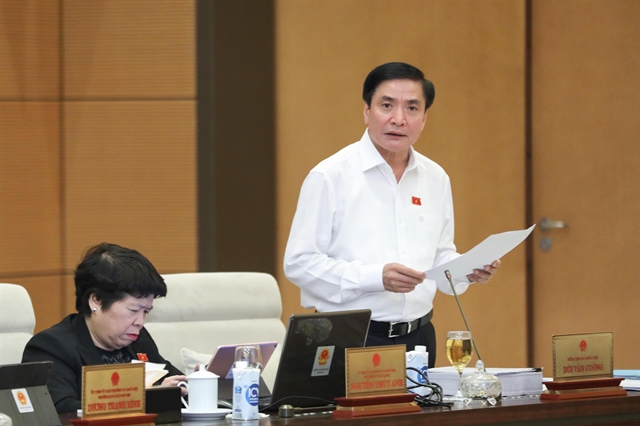 Politics & Law
Politics & Law

 |
| Bùi Văn Cường, secretary general of the NA and chairman of the NA Office, speaks at the session to discuss on the draft amended Law on Capital. — VNA/VNS Photo Doãn Tấn |
HÀ NỘI — Chairman of the National Assembly (NA) Vương Đình Huệ on Wednesday called for the NA Committee on Legal Affairs to review the Housing Law, emphasising that the NA unequivocally opposed the legitimisation of mini apartments.
He spoke at the session of the NA Standing Committee, which provided opinions on the draft amended Law on Capital.
According to the draft law, the Prime Minister would decide on the list, measures, and timeline for relocating industrial production facilities, healthcare institutions, universities, colleges, vocational schools, and headquarters of central government agencies and organisations.
The People's Committee of Hà Nội would determine the list, measures, and timeline for relocating facilities not covered by the above provisions.
In discussing this matter, Bùi Văn Cường, secretary general of the NA and chairman of the NA Office, expressed his agreement with the relocation of industrial production facilities, healthcare institutions, universities, colleges, vocational schools, and government agency headquarters from central urban areas to other places when they did not align with the overall urban planning.
Cường stated that this policy was necessary and had been discussed since the merger of Hà Nội and Hà Tây Province in 2008, but it needed to be implemented promptly and decisively to align with the capital's development, especially following the recent tragic fire incident in a mini apartment on Khương Hạ Street, Thanh Xuân District.
Currently, there are more than 2,000 houses referred to as mini apartments in Hà Nội.
“This highlights the challenges in controlling the construction and development of Hà Nội, even ten years after the Capital Law was enacted in 2012," he noted.
He also recognised that this problem resulted from excessive population density in the inner-city areas and a lack of strict management.
“The issue of relocating industrial production facilities, healthcare institutions, universities, colleges, vocational schools, and the headquarters of government agencies and organisations at the central and municipal level has been on the table for a long time. However, the implementation has been very sluggish, and the draft lacks clear provisions on the methods and timeline for relocation," he stressed.
Secretary of the Party Committee of Hà Nội Đinh Tiến Dũng asserted that planning standards and regulations were of utmost importance. He stated that the construction of mini apartment building on Khương Hạ Street was approved with six floors, but the building had nine floors in reality.
Dũng said that considering the specific conditions of this area, where there was only 2-3 metres of space in front of and behind the block, it was reasonable to limit construction to three floors.
He emphasised that the standards and regulations already existed, and he suggested giving the city the authority to make decisions regarding such matters in specific areas to ensure long-term security and safety.
Addressing the related issue of mini apartments, the NA Chairman Huệ called for the Committee on Legal Affairs to revise the Housing Law and decisively eliminate mini apartments from the law.
Huệ emphasised that the recent tragic fire in the mini apartment building, which claimed 56 lives, was the deadliest and most serious incident. He suggested that Hà Nội, with its authority, should consider setting standards and regulations on fire prevention and control in the city.
Minister of Justice Lê Thành Long said that after the enactment of the 2012 Capital Law, the imposition of administrative fines for certain violations in the fields of construction, land, and culture within the inner city had yielded positive results. It effectively deterred violations, prevented misconduct, and increased the awareness and responsibility of the citizens.
Specifically, he said, in the construction sector, the ratio of construction works violating regulations had decreased from 8.97 per cent in 2014 to only 2.13 per cent in 2020.
However, violations in fire prevention and control, food safety and hygiene, and advertising were becoming increasingly complex. The level of fines had not yet ensured a sufficient deterrent effect and had not adequately guaranteed social security and public safety, he added.
Furthermore, the current regulations regarding the application of higher administrative fines in certain areas within the inner city were no longer appropriate, as they did not ensure the fairness and strictness of the law when applying two types of sanctions in the same city.
Therefore, the draft law introduced regulations on fire prevention and control, food safety and hygiene, and advertising, allowing the city’s People's Council to stipulate higher fines, but not exceeding twice the fine amounts set by the Government for corresponding violations in these fields.
The draft law also proposed halting the supply of electricity and water to non-compliant construction works.
Regarding this matter, Chairman of the NA Defence and Security Committee Lê Tấn Tới argued that electricity and water supply were tied to human rights and citizens' rights. Thus, he suggested a re-evaluation of the provision to disconnect electricity and water supply for violations in the areas of land, construction, and development.
The amended Capital Law is set to be presented to the NA during the upcoming session scheduled for October 6. — VNS




